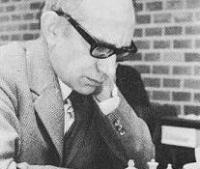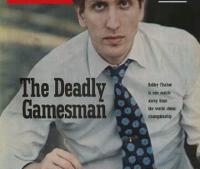
Attacking Levenfish
Grigory Levenfish was born on the 9th of March 1889 in Poland which was then part of the Russian Empire. He was the second Soviet chess player, after Botvinnik, who was awarded the title of grandmaster of the USSR in 1937. He played chess since the age of six. He spent most of his formative years in St. Petersburg, where he attended university and studied chemical engineering.
He was Leningrad Champion in 1922, 1924 and 1925 and also won the USSR Championship in 1934 and 1937. The same year he drew a match with Mikhail Botvinnik (+5 -5 =3), this being the last major success of his chess career. The Bolsheviks refused him permission to travel abroad and compete in tournaments such as AVRO 1938; even though he was the reigning Soviet Champion.
Although a strong chess player, he is acknowledged for being the co-writer together with Smyslov of the bible book “The Theory of Rook Endings” (later published in English in 1971 under the title “Rook Endings”). Smyslov told the story of when Levenfish visited him, at the end of his life, equipped with an enormous pile of papers. It was a manuscript detailing his lifetime work on rook endings. He asked Smyslov to check for errors, and the book was published in 1957 with both names. Smyslov generously admits that all of the hard work was carried out by Levenfish!
He was one of the greatest experts of rook ending theory. The ending, won by Levenfish against Eliskases, was acknowledged by the best at the Moscow International tournament in 1936.
Grigory Levenfish was the initiator of the release of the Soviet encyclopedia "Modern openings," the 1st volume of which was published under his edition (1940); author of many theoretical analyses, articles, game collections, and the creator of the Levenfish Attack, a sharp variation of the Sicilian Defence, conceived to combat Black's Dragon set-up.
With a deep understanding of the game and a keen eye for brilliantly imaginative moves, Levenfish’s play was marked by elegant combinations, unexpected tactical blows and deep endgame analyses. He was also one of the few pre-revolutionary masters who didn't end up abroad and fruitfully passed on his knowledge to the first generation of young Soviet players.
Levenfish was honored with the title of master of sports of the USSR in 1947 and awarded the GM title in 1950.
He passed away in Moscow in 1961.
.






